Elevating Fieldwork Experiences: The Role of Evidence-Based Practice in Occupational Therapy
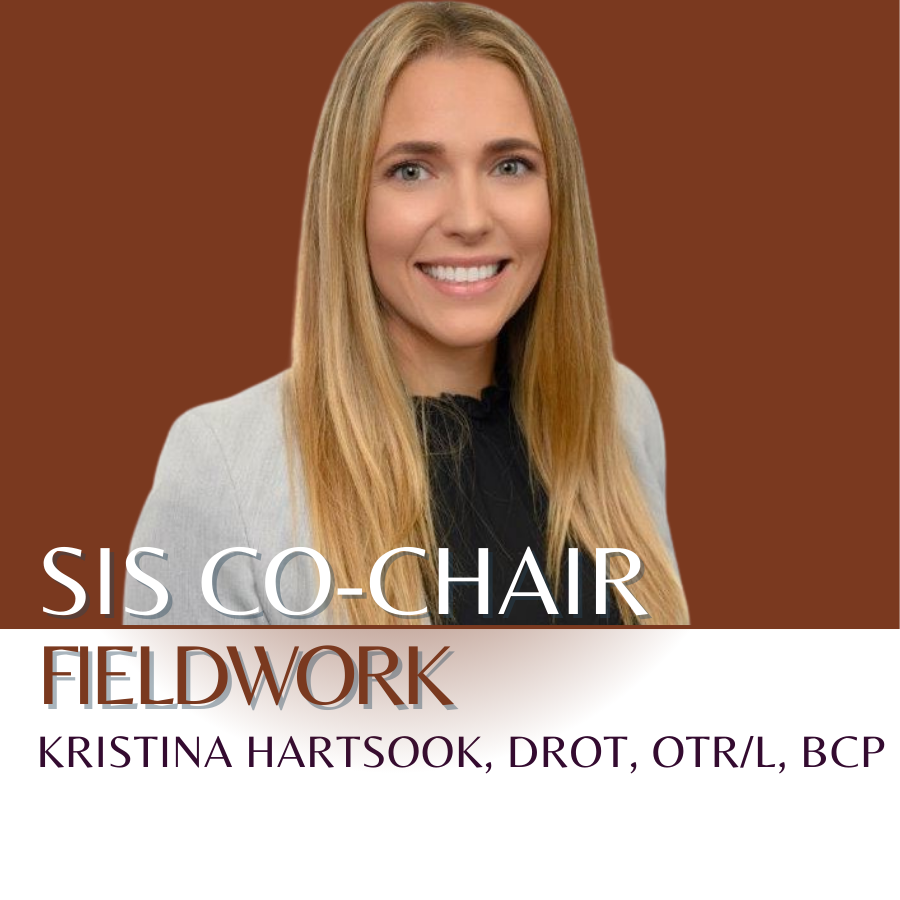 Elevating Fieldwork Experiences: The Role of Evidence-Based Practice in Occupational Therapy
Elevating Fieldwork Experiences: The Role of Evidence-Based Practice in Occupational Therapy
Kristina Hartsook, DrOT, OTR/L, BCP
 Elevating Fieldwork Experiences: The Role of Evidence-Based Practice in Occupational Therapy
Elevating Fieldwork Experiences: The Role of Evidence-Based Practice in Occupational Therapy
Kristina Hartsook, DrOT, OTR/L, BCP
Empowering students in fieldwork: Building emotional intelligence skills through self-assessment
Lucerito R. Gonzalez, COTA/L, MSOTS
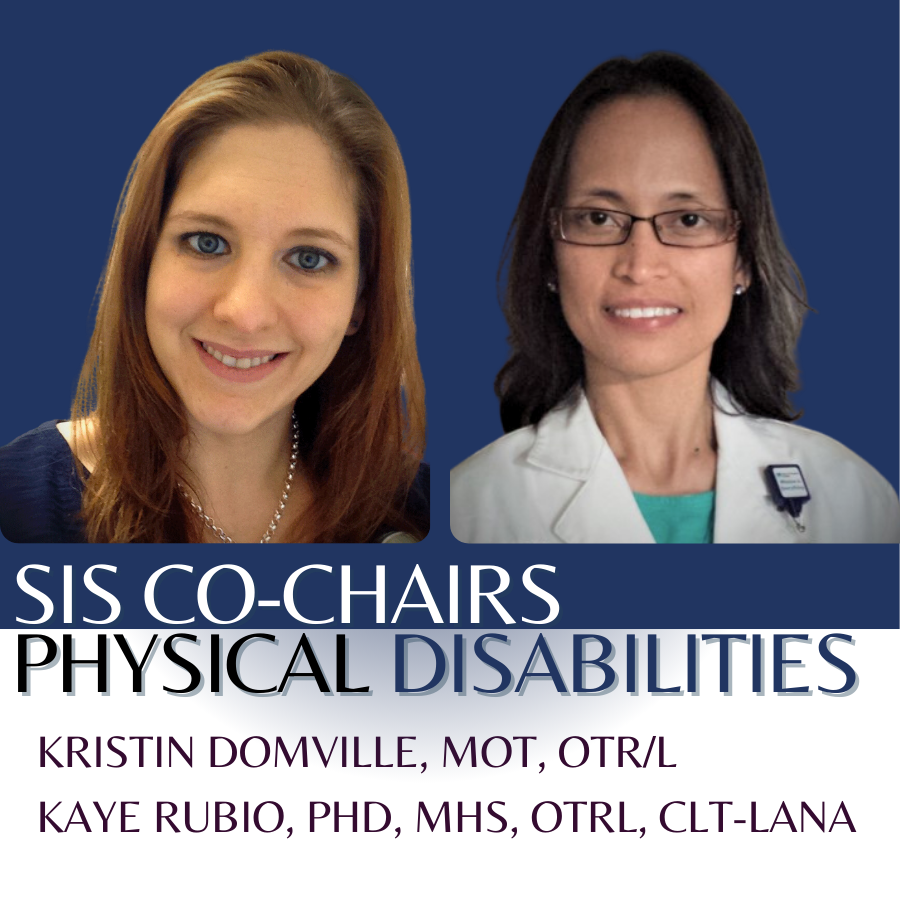 Occupational Therapy interventions to address axillary web syndrome: A debilitating side effect of breast cancer treatment
Occupational Therapy interventions to address axillary web syndrome: A debilitating side effect of breast cancer treatment
Brittany Hypes, OTD, OTR/L, CSRS, C-MLD, Kaye Rubio, Ph.D., MHS, OTR/L, CLT-LANA, & Kristin Domville, OTD, MOT, OTR/L
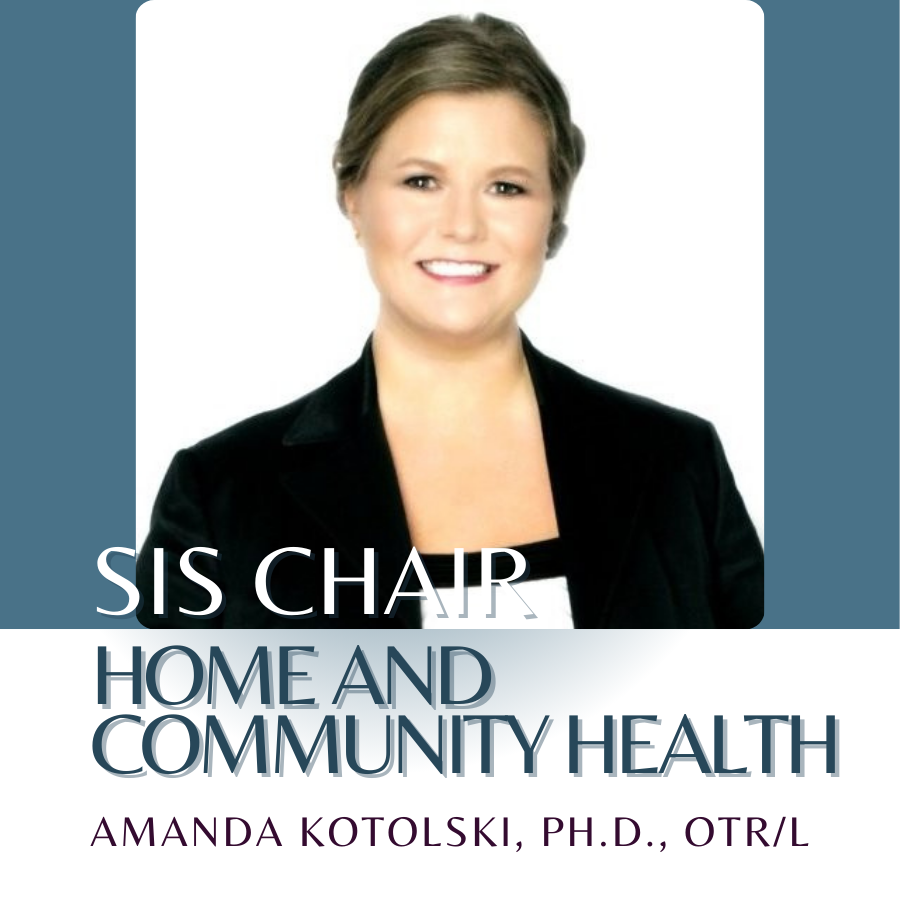 Home and community health therapy services post Public Health Emergency (PHE)
Home and community health therapy services post Public Health Emergency (PHE)
Amanda Kotolski, Ph.D., OTR/L
 A critique of the meshing hypothesis:
A critique of the meshing hypothesis:
Using Shulman’s knowledge domain theory to facilitate effective instruction

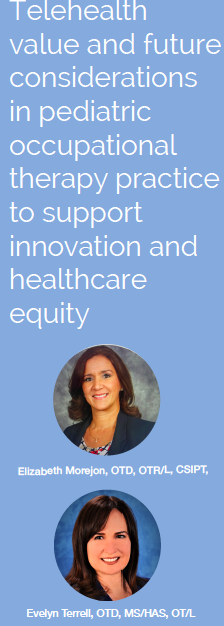 Telehealth value and future considerations in pediatric occupational therapy practice to support innovation and healthcare equity
Telehealth value and future considerations in pediatric occupational therapy practice to support innovation and healthcare equityby: Elizabeth Morejon, OTD, OTR/L, CSIPT, and Evelyn Terrell, OTD, MS/HAS, OT/L
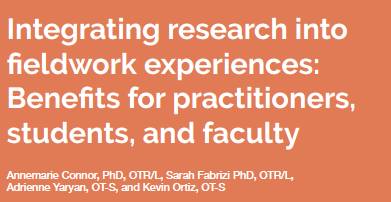 Integrating research into fieldwork experiences: Benefits for practitioners, students, and faculty
Integrating research into fieldwork experiences: Benefits for practitioners, students, and facultyby: Annemarie Connor, PhD, OTR/L, Sarah Fabrizi PhD, OTR/L, and Adrienne Yaryan, OT-S, and Kevin Ortiz, OT-S
As new occupational therapy programs continue to develop, it has become more difficult to find fieldwork (FW) sites for students since practitioners are less willing to supervise students due to the lack of resources, limited time, and questions of student preparedness (Varland et al., 2017). Unfortunately, this predicament is now exacerbated in the era of COVID-19. Emerging practice fieldwork sites, largely focused on prevention and health promotion in community-based practice, have been one mechanism for creating meaningful and productive fieldwork sites during this increasingly challenging landscape (Clarke et al., 2015; Dancza et al., 2013).
 The pelvic floor: The muscle group we all should know more about
The pelvic floor: The muscle group we all should know more aboutby: Sujata Martins, MS, OTR/L, CD
Out of sight, out of mind is a common saying for most and unfortunately tends to be applied to the pelvic floor. By learning to take care of our pelvic floor, most of us can avoid embarrassing accidents, as well as spending money on incontinence products, medications, and even surgery. It is also extremely valuable for pregnant women in order to prepare for delivery and postpartum healing, and plays an important role in intimacy.
 Lymphedema Basics: Increasing Client Occupations
Lymphedema Basics: Increasing Client Occupationsby: Candice D. Young E.d.S., COTA/L, CLT
Increasing independence in occupations is what occupational practitioners are known for. For many experienced clinicians, it is a daily routine recognized through experience through evidence-based practices. However, many clients suffer from diseases uncontrolled by either primary or secondary causes resulting in delayed healing or ongoing therapy services. The growing anxieties of past medical history, congenital conditions, or surgeries are not always straightforward nor understandable, and the complications may be unknown. Lymphedema could be lurking in the foreseeable future for many with no current cure and awaiting breakthrough treatments (Schaverien and Aldrich (2018).
by: Anette Bullard, MEd, COTA/L and Anjali Parti, OTD, OTR/L
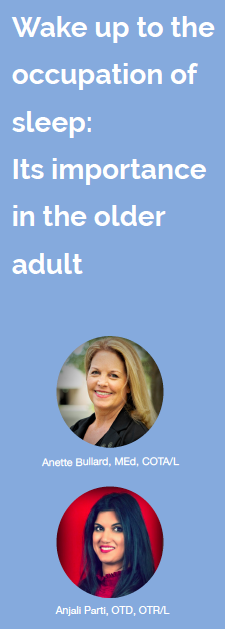 Everyone has experienced having to power through the day after a night of not sleeping well with every aspect of the day feeling more challenging due to your lack of sleep. The National Institute of Health (2017) identifies sleep as one of the most important occupations for maintaining all aspects of health. In fact, the Centers for Disease Control and Prevention (2018) has recognized sleep deprivation as a public health problem with broad, negative effects on safe occupational performance. For the older adults the challenges brought on by age compounded with a lack of sleep can further decrease successful occupational performance. Many age-related changes tend to disturb patterns of sleep and the myth that older adults need less sleep is actually incorrect (Suni, 2022b). The older adult is confronted with additional sleep obstacles such as, chronic conditions, medications, diminished physical activity, and decreased cognitive exercise, all of which have all been associated with decreases in sleep satisfaction. The resulting downward spiral of poor sleep results in less successful occupational engagement. The Occupational Therapy Practice Framework includes ‘rest and sleep’ as an area of occupation and defining occupational therapy practitioners as qualified professionals to assist clients with the occupation of rest and sleep (American Occupational Therapy Association, 2020). This brief article seeks to assist practitioners with identifying resources and awareness for more consistently addressing the occupation of sleep in the older adults.
Everyone has experienced having to power through the day after a night of not sleeping well with every aspect of the day feeling more challenging due to your lack of sleep. The National Institute of Health (2017) identifies sleep as one of the most important occupations for maintaining all aspects of health. In fact, the Centers for Disease Control and Prevention (2018) has recognized sleep deprivation as a public health problem with broad, negative effects on safe occupational performance. For the older adults the challenges brought on by age compounded with a lack of sleep can further decrease successful occupational performance. Many age-related changes tend to disturb patterns of sleep and the myth that older adults need less sleep is actually incorrect (Suni, 2022b). The older adult is confronted with additional sleep obstacles such as, chronic conditions, medications, diminished physical activity, and decreased cognitive exercise, all of which have all been associated with decreases in sleep satisfaction. The resulting downward spiral of poor sleep results in less successful occupational engagement. The Occupational Therapy Practice Framework includes ‘rest and sleep’ as an area of occupation and defining occupational therapy practitioners as qualified professionals to assist clients with the occupation of rest and sleep (American Occupational Therapy Association, 2020). This brief article seeks to assist practitioners with identifying resources and awareness for more consistently addressing the occupation of sleep in the older adults.
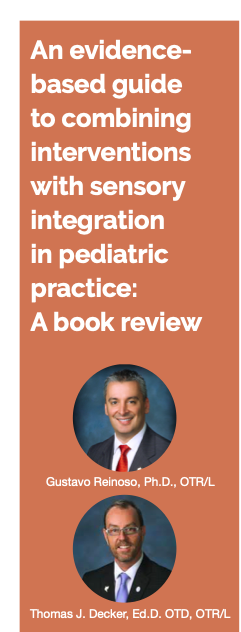
by: Gustavo Reinoso, Ph.D., OTR/L and Thomas J. Decker, Ed.D. OTD, OTR/L
Because of the complexity of the clients we assess and treat utilizing sensory integration, we often wonder about how we can best address a family’s needs by incorporating other approaches during our busy practices. The concept of combining and blending approaches is not new. In 1995, Blanche, Botticelli and Hallway published a textbook “Combining Neuro-Developmental Treatment and Sensory Integration principles: An Approach to Pediatric Practice.” The textbook was well-received among clinicians
As you may know, the Florida Department of Health (DOH) issued a press release last week containing guidelines related to the Treatment of Gender Dysphoria for Children and Adolescents.As stated, the press release is guidance and does not create a requirement for health care practitioners.According to our practice framework, and regardless of condition or diagnosis, occupational therapy practitioners support clients by offering evidence-based treatments which affirm the lived experience, encourage exploration of identity, provide a safe and supportive environment, maximize strengths and resources, reflect on consequences of treatment approaches, facilitate participation in preferred roles, and prevent loss of engagement in meaningful occupations.Clinicians should also feel free to reach out to [email protected] with comments, concerns or to speak with practitioners familiar with these topics.FOTA will continue to share information as it becomes available.Sincerely,Your Government Affairs Team"
Contemplating the Capstone
by Pamela Kasyan-Howe, OTD FOTA SIS Fieldwork
Virtual Reality in Occupational Therapy
By Jonathan E. Urrely, OT-S and Carlos Martoral
ASSESSING STUDENTS’ CLINICAL REASONING ON FIELDWORK
By Maria A. Colmer, OTD, OTR/L, Associate Professor, Academic Fieldwork Coordinator, Florida Gulf Coast University, OT Program, FLOTEC
Motivation: An important factor in adherence to home programs for patients with chronic conditions
By Kristin Domville, DrOT, OTR/L and Kaye Rubio, Ph.D., MHS, OTR/L, CLT-LANA,

Eligible providers will have 60 days to complete the application for funding. Providers must apply by February 14, 2022.
Amazon searches starting from www.flota.org benefit FOTA!